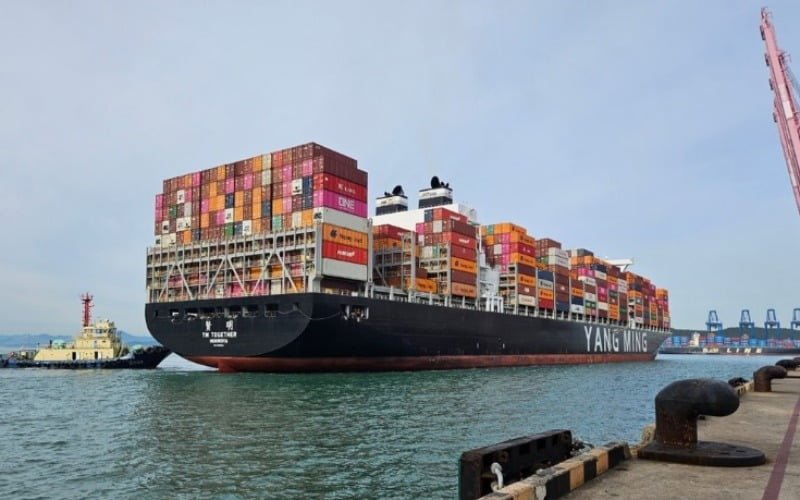Starting this year, Yang Ming Marine Transport Corporation (Yang Ming) is beginning to fuel its fleet with sustainable biofuel. This initiative aims to implement the Company’s sustainable development strategy, achieve net-zero emissions by 2050, and provide low-carbon transportation services to customers. YM Together, the 11,000-TEU container ship, recently became the first foreign-flagged vessel in South Korea to bunker biofuel, marking the Company’s steady progress in sustainable development and energy transition.
In collaboration with KPI OceanConnect, a marine energy supplier, YM Together, currently serving the Trans-Pacific route PN3, bunkered the B30 HSFO biofuel at Pusan Port in South Korea on June 26. This type of biofuel is a blend comprising used cooking oil (UCO) made of native plants, which complies with ISO 8217 and meets International Sustainability & Carbon Certification (ISCC) standards. This biofuel also meets the green fuel standards of the FuelEU Maritime Initiative, reducing up to 25% of GHG emissions than do conventional marine fuels.
Apart from the biofuel, onboard facilities such as scrubbers and shore power systems (AMP) enable YM Together to effectively cut GHG emissions and offer customers transport services that are sustainable and environmentally friendly. The addition of Pusan port as a biofuel bunkering port in Asia increases flexibility in bunkering options for different routes, which in turn helps Yang Ming to expand the use of biofuel. In the meantime, the Company is providing biofuel usage data requested by a publicly owned local research institute in South Korea, hoping to accelerate the sustainable goal of energy transition in the industry by sharing practical experiences and contributing to academic research.
In response to the impact of global climate change, Yang Ming is carrying out various energy-saving measures in its operations to improve the fleet’s energy efficiency. These measures include retrofitting existing ships for energy efficiency, adopting smart technology to enhance onboard energy monitoring, using weather routing system to optimize routes and reduce fuel consumption, and fitting vessels with AMP systems for shore power.
In 2023, Yang Ming’s fleet reduced carbon intensity by 61.86% compared to the baseline year of 2008, achieving the IMO’s goal of a 40% reduction by 2030 ahead of time. Looking forward, Yang Ming will continue using ISCC-certified biofuel to cap its total yearly GHG emissions, reduce the pressure of carbon emissions on customers and the entire supply chain, and sail towards the net-zero goal of maritime transport.

Biofuel Bunkering
Biofuel bunkering involves the process of supplying ships with sustainable biofuels, typically at ports. This alternative fuel source, derived from renewable resources like used cooking oil or plant oils, helps reduce greenhouse gas emissions compared to traditional marine fuels. It’s an essential step towards achieving sustainability goals in maritime transport, offering cleaner energy options for vessels worldwide.
About Yang Ming
Established on December 28, 1972, Yang Ming Marine Transport Corporation (YM) specializes in container transportation with service routes crisscrossing Asia, Europe, the Americas, Australia, and Africa. To date, we have set up over 241 global offices in 87 countries. Our regional centers in the U.S., Panama, Germany, Greece, and Singapore offer uninterrupted services.
Since the beginning, YM has upheld its core values of “Teamwork, Innovation, Integrity, and Pragmatism.” We deliver quality marine transport services with punctuality, speediness, reliability, and economy. We are committed to fulfilling our vision of becoming an outstanding marine transport corporation in the world.
Through partnerships with key global competitors, YM is able to effectively coordinate its global operation resources and provide customers with more comprehensive transport services. As part of the effort to increase international competitiveness and service quality, YM has so far acquired an array of local and foreign certifications.
As of June 2024, Yang Ming operates a fleet of 94 vessels with a 7.959-million-D.W.T / operating capacity of 707 thousand TEUS, of which container ships are the main service force.

